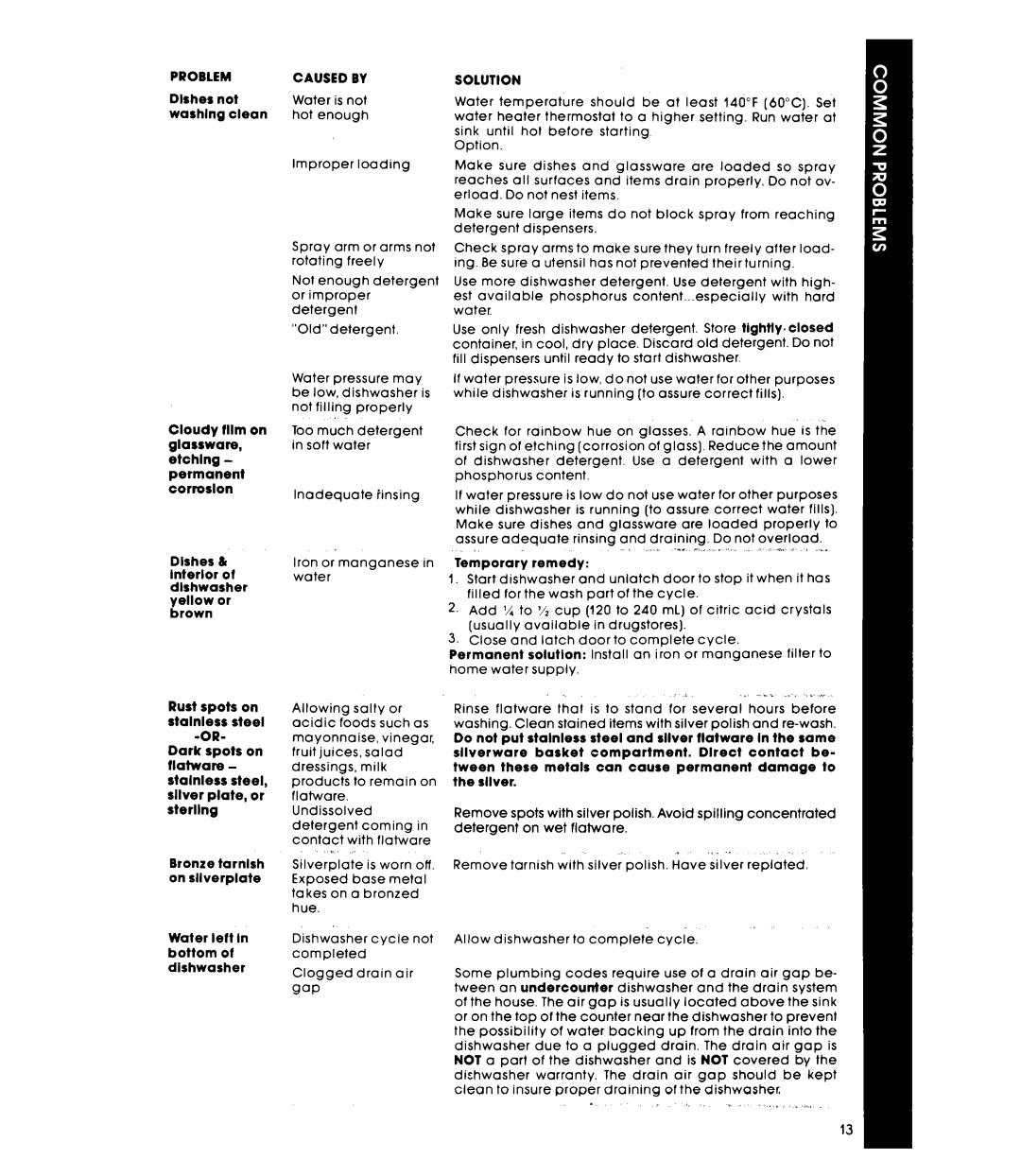
PROBLEM
Dlshes not washlng clean
Cloudy film on glassware, etching - permanent corrosion
Dlshes & lnterlor ot dlshwasher
p; or
Rust spots on stalnless steel
Dark spots on tlatware - stalnless steel, sliver plate, or sterling
Bronze tarnish on sllverplate
CAUSED BY
Water is not hot enough
Improper loading
Spray arm or arms not rotating freely
Not enough detergent or improper
detergent
“0ld”detergent.
Water pressure may
be low, dishwasher is not filling properly
Too much detergent in soft water
Inadequate iinsing
Iron or manganese in water
Allowing salty or acidic foods such as
mayonnaise, vinegar, fruit juices, salad dressings, milk products to remain on flatware.
Undissolved
detergent coming in contact *,, with flatware
Silverplate is worn off. Exposed base metal takes on a bronzed hue.
SOLUTION
Water temperature should be at least 140°F (60°C). Set water heater thermostat to a higher setting. Run water at sink until hot before starting,
Option.
Make sure dishes and glassware are loaded so spray reaches all surfaces and items drain properly, Do not ov- erload. Do not nest items.
Make sure large items do not block spray from reaching detergent dispensers.
Check spray arms to make sure they turn freely after load- ing. Be sure a utensil has not prevented their turning.
Use more dishwasher detergent. Use detergent with high-
est available phosphorus content...especially with hard water.
Use only fresh dishwasher detergent. Store tightly.closed container, in cool, dry place. Discard old detergent. DO not fill dispensers until ready to start dishwasher.
If water pressure is low, do not use water for other purposes while dishwasher is running (to assure correct fills).
Check for rainbow hue on glasses. A rainbow hue’is the first sign of etching [corrosion of glass]. Reducethe amount
of dishwasher detergent. Use a detergent with a lower phosphorus content.
If water pressure is low do not use water for other purposes
while | dishwasher | is | running | (to | assure | correct | water | fills). | ||||
Make | sure | dishes | and | glassware | are | loaded | properly | to | ||||
assure | adequate | rinsing | and | draining. | Do | not | overload. | 2 .” . | ||||
,. |
|
|
|
|
|
| _ |
| ||||
Temporary | remedy: |
|
|
|
|
|
|
|
|
|
| |
I. Start | dishwasher | and | unlatch |
| door to | stop it when it has | ||||||
filled | for | the wash | part | of | the | cycle. |
|
|
|
| ||
2.Add l/4 to % cup (120 to 240 mL) of citric acid crystals
(usually available in drugstores].
3.Close and latch door to complete cycle.
Permanent solutlon: Install an iron or manganese filter to home water supply.
L
Rinse flatware thal is to stand for several hours before washing. Clean stained items with silver polish and
sllverware basket compartment. Direct contact be-
tween these metals can cause permanent damage to the sliver.
Remove spots with silver polish. Avoid spilling concentrated detergent on wet flatware.
| s | ... .. |
Remove tarnish with silve;polish. | Have | silver repldted. |
Water left In bottom of dishwasher
Dishwasher cycle not Allow dishwasher to complete cycle. completed
Clogged | drain air | Some | plumbing |
| codes | require | use | of a drain | air | gap | be- | ||||||
gap |
| tween | an undercounter | dishwasher |
| and | the | drain | system | ||||||||
|
| of | the | house. | The | air | gap is usually | located | above | the | sink | ||||||
|
| or | on | the top | of the | counter | near the | dishwasher | to prevent | ||||||||
|
| the | possibility |
| of | water | backing | up | from | the | drain | into | the | ||||
|
| dishwasher | due | to | a | plugged | drain. | The | drain air gap is | ||||||||
|
| NOT | a part | of | the | dishwasher | and | is NOT covered | by | the | |||||||
|
| dishwasher | warranty. |
| The | drain | air | gap | should | be | kept | ||||||
|
| clean | to insure | proper | draining | of the | dishwasher. |
|
| ||||||||
|
|
|
|
|
|
|
|
|
| . |
| ,. |
| I | . | j .;, | |
